Mary Anne Yarde's Blog: The Coffee Pot Book Club , page 101
March 2, 2020
#BookReview — Oraiáphon: A Novella of The Empire by Marian L Thorpe #HistoricalFantasy @marianlthorpe

OraiáphonA Novella of The EmpireBy Marian L Thorpe
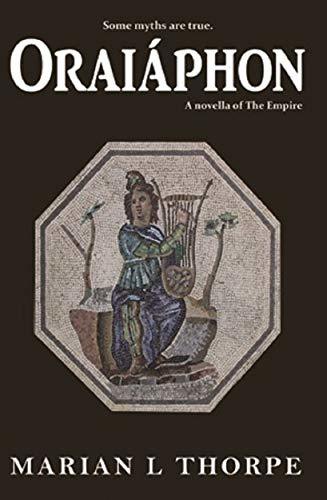
Can a musician heal, when a physician cannot? All scáeli’en know the tale of Oraiáphon: how his music tamed the wildest beasts and charmed the darkest god. Only a fable—until song becomes Sorley’s last supplication to bring Cillian back from certain death, for Lena, for their child, and for the country that so desperately needs him.

"Courage comes in many forms, Sorley, and only men blinded by prejudice and thoughtlessness think otherwise."
Lord Sorley had dreamed of becoming a scáeli — a travelling musician, a historian, the holders and disseminators of deeds and stories. Instead, he had become a toscaire, an envoy for Linrathe. But his hopes, his dreams no longer matter, for the man he has loved for years is hovering in that shadowy world between life and death.
The doctor has told both Lord Sorley and Lena that Cillian, Major of the Empire and partner to Lena, will die and that they should prepare themselves. But neither of them can. Cillian means so much to both of them. They know his life is in the gods' hands, but they will not give up on him, not while he still breathes.
But, maybe, if Sorley plays for him, he might just get through to Cillian's fevered mind that there is something worth fighting for – worth living for. The doctor may well be losing hope, but Sorely will not. Not yet. Not until that last breath leaves Cillian's body.
From the desperation and sorrow that comes when a loved one is dying to the celebration of a child's birth. Oraiáphon by award-winning author, Marian L Thorpe is the exciting new instalment in the Empire's Legacy series.
I absolutely loved every minute of Thorpe's Empire's Legacy series, and I was very excited when I learnt that Thorpe had written a novella about Lord Sorley. Within moments of reading, I felt myself being transported back into the world that I had loved so much — it was as if I had never left. And it was also great to be back amongst friends, to once again travel with the fantastic characters that Thorpe depicts with such skill and diligence. Thorpe's crystalline prose washed over me as I lost myself in the narrative. The fantasy world that Thorpe has created is ambitious, but it is also incredibly vivid and real in the telling. This is a world where a reader can lose themselves in and time no longer seems to matter. All that matters is the story. All that matters are these characters. Thorpe tells this story with an impressive sweep and brilliance, which makes Oraiáphon next to impossible to put down.
Lord Sorley was a character that always intrigued me, and I was really looking forward to reading this book from his perspective. Sorley is an incredibly tortured soul, and he hides a shameful secret, one that he has hidden all of his life. Sorley comes from a kingdom where the sexual attraction between members of the same sex is not tolerated. But here, in the Kingdom of the Western Empire, it is a normal part of everyday life. Sorley struggles with this new found freedom. He still can't quite believe that his attraction to the same sex is not forbidden, it is not looked down upon, and no one judges you for your choices. As long as it is consensual then there is nothing to fear. In this kingdom, you are free to love as you will — what a contrast to the nation Sorley came from. It is no wonder that at times, Sorley feels untethered and somewhat dislocated.
Lord Sorley's relationship with Cillian is heartbreakingly tragic, as unrequited love so often is. Sorley is so in love with Cillian. He would do anything for Cillian, absolutely anything. Sorley knows nothing can come of their relationship, and he has a loving partner of his own. Druisius is incredibly understanding of Sorley's feelings, and Duisius is such a caring and wonderful man that often Sorley feels terribly conflicted. He knows that the love he feels for Cillian is the love he should feel for Druisius, but what the mind understands and the heart demands so often conflict. Cillian is in a loving relationship with Lena, and they are expecting a child together. There is no room for Sorley in their relationship other than that of a trusted friend.
Although this book is told from Sorley's point of view, we are reunited with some of the characters that made the Empire's Legacy saga so enthralling. Once again, I felt drawn to Cillian. Cillian is an honourable man who has a sharp wit and a keen intelligence. He is also extraordinarily compassionate and to witness him fighting for his life was an emotional experience. I, along with Sorley and Lena, hoped for a miracle.
Oraiáphon is not a novella that stands alone. You do need to read the other three books in the series first:
Book 1: Empire's DaughterBook 2: Empire's HostageBook 3: Empire's Exile
Empire's Legacy is a series that demands your attention from start to finish. It is as brilliant as it is mesmerising. Oraiáphon is a very welcomed addition to the saga.
I Highly Recommend.
Review by Mary Anne Yarde.The Coffee Pot Book Club.
Pick up your copy ofOraiáphonAmazon UK • Amazon US
Marian L Thorpe
 Not content with two careers as a research scientist and an educator, Marian L Thorpe decided to go back to what she’d always wanted to do and be a writer. Author of the alternative world medieval trilogy Empire’s Legacy, Marian also has published short stories and poetry. Her life-long interest in Roman and post-Roman European history informs her novels, while her avocations of landscape archaeology and birding provide background to her settings. As well as writing and editing professionally, Marian oversees Arboretum Press, a small publishing imprint run as a collective. Marian is currently writing Empire’s Reckoning, the next book in her series.
Not content with two careers as a research scientist and an educator, Marian L Thorpe decided to go back to what she’d always wanted to do and be a writer. Author of the alternative world medieval trilogy Empire’s Legacy, Marian also has published short stories and poetry. Her life-long interest in Roman and post-Roman European history informs her novels, while her avocations of landscape archaeology and birding provide background to her settings. As well as writing and editing professionally, Marian oversees Arboretum Press, a small publishing imprint run as a collective. Marian is currently writing Empire’s Reckoning, the next book in her series.Connect with Marian: Website • Twitter • Goodreads.
Published on March 02, 2020 21:00
Check out M J Porter's fabulous The Tenth Century Series #HistoricalFiction #Medieval @coloursofunison
Published on March 02, 2020 19:00
March 1, 2020
A Conversation with #thriller author, Jim Adameit #mustread #Interview @JimAdameit

A Conversation with Thriller author,Jim Adameit
Please give a warm Coffee Pot welcome to Jim Adameit.
 MA: It is so lovely that you could take time out to chat with us today. Before we begin, could you please tell my readers a little about you.
MA: It is so lovely that you could take time out to chat with us today. Before we begin, could you please tell my readers a little about you.JA: Hello, my name is Jim Adameit. As I explain on my website, my surname supposedly means ‘son of Adam’ (the ‘eit’ suffix = ‘son of’) in German / Lithuanian. I was taught to pronounce it ‘ADD-a-mitt’, but my relatives in Europe, pronounce it differently. I’m a young 63 years old (I still listen to and enjoy rock and roll music - from the Stones, and Led Zeppelin to the Black Keys). I work a full time day job as a proposal manager/writer for a US construction company (Williams Industrial Services Group, LLC). So I write novels on the weekends, striving to become a successful full time novelist one day soon.
MA: I have read your book, The Definition of Experience, and I thought it was fabulous. Can you tell us what inspired you to write The Definition of Experience?
JA: I’ve read thriller novels for years and wondered why I didn’t see any novels about the industry in which I’d worked for many years, that of Electronic Manufacturing Services. It’s a $500 billion global industry that presumably not many people know about, much less have heard of. Michael Crichton got somewhat close with his ‘Disclosure’ novel, which had an electronics product manufacturer as back-story & setting. Joseph Finder wrote business / corporate thrillers about twelve years ago, but then he shifted over to start writing spy novels. Donald Westlake wrote some darknovels about business. No one wrote about MY industry though. So one day some years ago, I thought of a story idea (which became this novel), and I started writing plot points, then scenes, then it evolved into this, my debut novel ‘The Definition of Experience’. It’s a ‘what if’… What if a few executives from a successful electronic manufacturing services company had a legitimate business side, and also a covert illegitimate business side - the latter of which where they planted financially desperate product design engineers into companies – Original Equipment Manufacturers (ODMs) to steal design packages and sell them on a black market for their own financial gain? To be honest, I’d be surprised if that hasn’t already happened, or is going on now in real life. My story is overly detailed as to some of the nuances of the business activities, admittedly, as it’s meant to be a primer of sorts. I thought it’d be interesting though, to share an inside look into just some of what goes on in those companies.
My intended audience is for adults, and in the spirit of full disclosure, my novel has 3 fairly racy chapters (20, 68 and 78) along with some f-bombs and adult language. But that’s REAL life and the world in which we live. This isn’t a kid’s book. I’ve been told it’s deliciously complex like a Tom Clancy novel, and wildly entertaining like a Finder or a Crichton, so I’ll take that. I hope other adult readers will agree too!
MA: Well, your novel certainly had me gripped. How did you come up with your setting and your characters?
JA: I’ve lived in various states in the US, including Colorado. And I’ve travelled internationally in a prior life, including a 3 month stint in Dublin, Ireland. So I chose those two locations for the main physical settings. Then I incorporated my story setting of life in this electronics manufacturing business setting. As for the characters, I made up an excel matrix of character names, profiles, attributes and visual characteristics. And I thought of actors and actresses who came to mind when I thought of each one. I copied and pasted thumbnail pics of each character, so as I wrote the story I used each one as a mental image making it easier for me to describe along the way. For example, I envision Tom Hanks as Dan Gamble, and Dana Delaney as his wife, Lori. (I now call this my ‘casting catalog’, in a nicely formatted pdf format showing my visualizations of each major character, if anyone would be interested in seeing it – but not so as to spoil each reader’s mental images of characters)
MA: There are many books in the techno-thriller genre. Can you tell us three things that set your novel apart?
JA:a. The most unique thing setting it apart, is that it’s the first-ever novel written about this specific industry, that of Electronics Manufacturing Services. Anyone reading this on an electronic device (computer, iPad, Kindle, Internet, etc.) is using an electronic device made by a company in this industry. As one reviewer said, “…It is highly recommended reading for those seeking something satisfyingly different than so many overdone spy and terrorism novels..."
b. I’m looking to focus on several under-served sub-genres to perhaps create a new sub-genre, which I believe is missing from today’s novel choices. Part - · Techno-thriller (more technology thriller focus, and less typical - often far-fetched - ‘techno’ thriller components of sci-fi and military themes). · Corporate-noir. The dark side of corporate life. · International crime mystery. This with a different slant, with story topics, and plot points markedly different than any others written about.
c. Many novels have characters that are all good or all bad. I seek to create characters that are multi-dimensional and notably human, each with their own private, personal arsenal of ethics and morality. I try to have my characters exhibit a bit of their ‘situational morality’ along the way. Hopefully readers will contemplate their own morality as they read the story. Could they (readers) imagine themselves in that situation having to justify taking a particular action? Could or would they do as this character has done? Each person’s ethics, morals, along with a bit of Maslow’s hierarchy of needs, our fight or flight reflexes, and our own individual instincts also drive behavioural choices in each of us. Human behaviour can be fascinating but often unpredictable.
MA: One last question, can you share with us what you are currently working on?
JA: I’m currently writing the sequel novel, called ‘The Definition of a
Secret’, which I plan to self-publish by June 2020. This will be part techno-thriller, part corporate noir, and part international mystery thriller, which takes place in China and the US. My inspiration of this story came from real life events, so I hope readers will find it as fascinating to read as I find it is to write. After that, I have in mind the next novel in this series, tentatively called ‘The Definition of Revenge’. This novel’s story is inspired by a 1983 movie I saw, that’s left its mark on me ever since.

MA: Thank you so much for joining us today.
If you would like to learn more about Jim’s book, then you know what to do. SCROLL DOWN.
The Definition of Experience (Dan Gamble, Book 1)By Jim Adameit

One Man’s Stand Against the Corporate Machine
An edgy, racy, action-packed business / financial / technology thriller, about the global industry that manufactures and brings us all our smart phones, laptop computers, cloud servers – and virtually any other electronic products you can think of.
Think this is boring stuff?
In a US$500 billion global market – with careers and that much money at stake?
Think again…
A primer on an industry that most people don’t know exists…A cautionary tale for those people who do…
Excerpt
At Henry’s, patrons were welcomed to throw darts virtually anywhere on that left wall - but onlyon that wall. All other walls were off limits. And from no further away than the red line taped on the floor, about ten feet away, discouraging bad aim and errant throws.
Of course, patrons who happened to be already sitting along that wall, positioned in the line of imminent fire, were both encouraged and compensated to move elsewhere for a few minutes, so as not to become unwilling collateral damage.
But that was all part of the experience. Sip on your beer, talk with your friends, and at any moment you might have to move aside for someone who wanted to hurl a few pointed projectiles your way. Those sitting or standing on the right side or at the bar up front opted out by definition.
Anyone who threw a dart anywhere else was quickly bounced out and told not to return.
Henry knew how to have fun, and he encouraged the same for his customers, but he wouldn’t tolerate anyone challenging his authority or not playing by his rules.
The house rules were specific, and Henry enforced them to the letter. Small paper targets could be taped on that wall. Some of those were traditional targets with red circles in the middle, surrounded by concentric red or black rings. Some targets were the faces of rock stars, movie actors, sports figures, or politicians past or present – even current or former husbands or wives were permissible targets. No one was off limits except for pictures of kids or animals.
The First Amendment was alive and well at Henry’s, but not when it came to kids or pets.
Henry’s pub, Henry’s rules, period.
Pick up your copy ofThe Definition of ExperienceAmazon UK • Amazon US • Smashwords
Jim Adameit
 Jim Adameit is the author of ‘The Definition of Experience’, his debut thriller novel in this series. Jim is a 30+ year seasoned veteran of the Contract Manufacturing / Electronic Manufacturing Services industry, in which he’s held various senior level global positions, including sales & marketing, contract administration, and project management.
Jim Adameit is the author of ‘The Definition of Experience’, his debut thriller novel in this series. Jim is a 30+ year seasoned veteran of the Contract Manufacturing / Electronic Manufacturing Services industry, in which he’s held various senior level global positions, including sales & marketing, contract administration, and project management. Connect with Jim: Website • Facebook • Twitter.
Published on March 01, 2020 21:00
#BookReview — One Night with His Rival by Robyn Grady #Romance @robyngrady

One Night with His RivalBy Robyn Grady
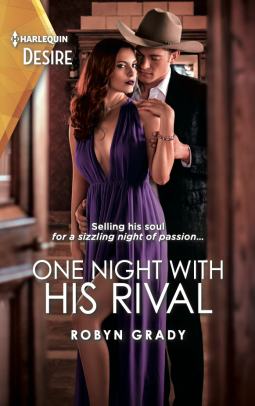
“Wanting something doesn’t make it good for you.”
Wealthy horse breeder Ajax Rawson can have any woman he wants. So why can’t he keep his hands off the one woman he can’t have? Beautiful, independent and passionate, Veda Darnel is the daughter of his family’s biggest competitor. Years of bad business blood makes their affair dangerous…and forbidden. But will accusations of foul play end their star-crossed romance before it even begins?

"For years, she had dreamed of Ajax Rawson telling her she was beautiful, making her blush. But that night he'd done so much more than that."
Veda Darnel, the one woman Ajax could not have. A long and bitter family feud between his father and Veda's ensured that the two of them had no business being together. But, when he kissed her, when he made love to her, the feud seemed irrelevant, stupid even.
Ajax Rawson was all kinds of wrong. He was renowned for his beautiful women, and it was well-known that the chase was his thing — even his sister agreed with that. And what would happen if her father found out? And yet, when Ajax looked at her, when he smiled just for her, Veda found it increasingly difficult to stop herself from wondering if the two of them had a future — a real happy-ever-after future.
However, before their relationship had even begun, a scandal hits the Rawson horse breeding and racing ranch which could have disastrous consequences for not only the Rawson family but the Darnel's as well.
From an illicit night of passion to a promise of forever, One Night with His Rival by Robyn Grady is what romance stories are all about.
With a narrative that is comfortingly familiar and enough obstacles for the dashing hero and determined, yet insecure, heroin to overcome, One Night with His Rival was everything I had hoped this book would be.
Grady has given us a ruggedly handsome cowboy in Ajax Rawson. He has a reputation of being a bit of a lady’s man and has been bestowed by the rather cringe-worthy name of Stud. And although he shies away from serious commitment, he does this out of fear, and not because he disrespects women. Ajax suffered deeply when his mother died when he was younger, but as his father crumbled beneath the weight of his grief, Ajax had stepped up, taken over and got his family through it. Ajax is a man of deep emotion, but he never wants to find himself in the same position as his father had been — if he should love, and for whatever reasons, he lost her, how would he survive it? But along came Veda, and all the promises he had made to himself seem somewhat irrelevant, for his heart is telling him, in no uncertain terms, that she is the one. I really adored Ajax, he is honourable and so incredibly compassionate, that it was no wonder that Veda almost swooned every time she saw him. He is also a character who is willing to not only listen to another's point of view, but also make judgements on his own life, because of that point of view. I thought he was a wonderful hero, that really drove this story forward.
Veda has many demons to slay through the course of this novel. Her childhood was not a happy one, and even now, she is still paralysed by panic attacks. Veda has been fighting her own demons all her life, and I thought the way Grady portrayed her anxiety, and how it affected not only the mind but the body was particularly well-drawn. Veda is also incredibly insecure, and spends the whole of this book thinking the worst of Ajax — she is convinced he will become bored with her and to avoid a hurt that may come later, she tries to guard her heart by convincing herself that what she feels for Ajax is just a physical reaction. I really felt for Veda, she is such a lovely, wonderful heroine, who at the end of the day, just wants to be loved. Her attempts to push Ajax away, was understandable, considering her past. But, with small steps, she comes to realise that love doesn't quite mean what she thought it was.
One Night With His Rival is a classic romance, with everything a reader would come to expect from such a book. I thoroughly enjoyed every minute of it, and I simply could not put it down. In fact, I read it in one sitting.
If you are looking from some wonderful escapism romance, then check out One Night with His Rival by Robyn Grady.
I Highly Recommend.
Review by Mary Anne Yarde.The Coffee Pot Book Club
Pick up your copy ofOne Night with His RivalAmazon UK • Amazon US
Robyn Grady
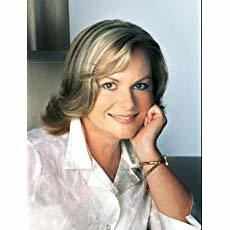 Robyn Grady's stories have been published in 29 languages with millions of copies sold worldwide. Her books have appeared at award ceremonies including the National Readers’ Choice, the Booksellers Best, and Australia's prestigious Romance Book of the Year.
Robyn Grady's stories have been published in 29 languages with millions of copies sold worldwide. Her books have appeared at award ceremonies including the National Readers’ Choice, the Booksellers Best, and Australia's prestigious Romance Book of the Year.Connect with Robyn: Website • Twitter • Facebook • Goodreads.
Published on March 01, 2020 20:00
February 27, 2020
Book Review — Requiem, Changing Times by R. J. Parker #YoungAdult #scific @RJParke90987826
Published on February 27, 2020 21:00
Join Mercedes Rochelle, as she explores usury in Medieval England. Mercedes’ fabulous book — A King Under Siege — is Free on Amazon Kindle for a Limited Time #History #Medieval #HistFic @authorrochelle

Usury in Medieval England: Lending Money to the KingBy Mercedes Rochelle
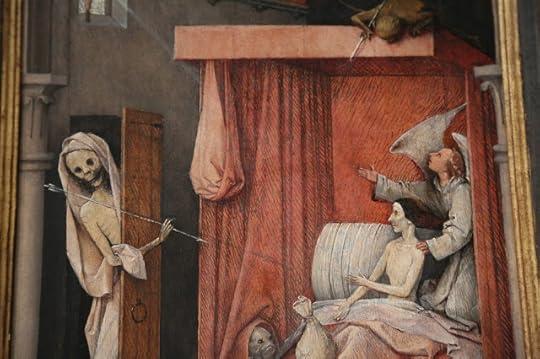 Detail from Death and the Miser by Hieronymus Bosch, National Gallery of Art, Source: Wikipedia.
Detail from Death and the Miser by Hieronymus Bosch, National Gallery of Art, Source: Wikipedia.It's pretty much a given that usury was considered a sin by almost all Christians; even Dante put usurers in the seventh circle of hell. However, the degrees of sinning and the exact definition of usury is debated to this day, so I am merely a novice dipping my big toe into the ocean of discourse. Nonetheless, I always wondered how people got away with it. After all, no one would take the risk of lending money without some sort of recompense, would they?
Since medieval Christians were forbidden to practice usury, it fell upon the Jews to engage in this unsavory profession—as long as they didn't lend to other Jews. After all, in England Jews were not allowed traditional trades; they were marginalized into socially inferior professions like tax or rent collection or money changing. Unfortunately for them, their practice made the Jewish moneylender the first victim whenever it was convenient for those in authority—or mobs—to rid themselves of their pesky creditors. Again and again we hear tales of their murder, arrest, torture, or expulsion, and I wonder how that behavior could possibly encourage the next generation to continue lending?
But in this article, I'm interested in how the crown got its loans. After all, war was an expensive business and the taxes approved by Parliament took months to collect—and they usually didn't cover all the bills. In fact, it is widely believed that Edward III was responsible for giving Parliament the idea that they could force their agenda on the king in exchange for the next round of taxes—first one, then the other. My research tells me that the money needed by the king was collected in advance, with the provision that the lenders would be paid off with the proceeds from the next tax collection, or sometimes "on the customs of the ports".
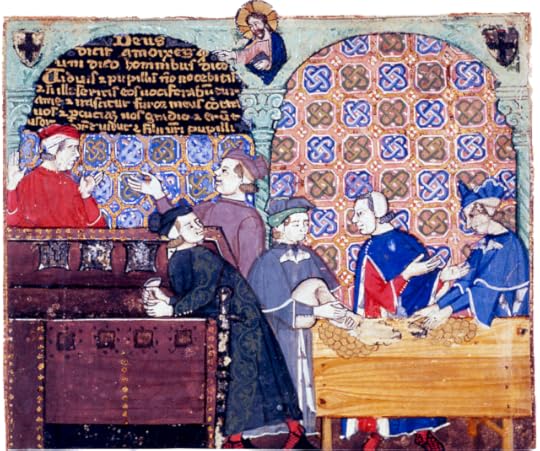 BL Add. 27695, f.8. Cocharelli of Genoa. Bankers in an Italian counting house in the 14th cent. Source: Wikipedia.
BL Add. 27695, f.8. Cocharelli of Genoa. Bankers in an Italian counting house in the 14th cent. Source: Wikipedia.The first three Edwards borrowed money from Italian banking-houses, but they were notorious for not paying back their loans. At first, the bankers were motivated by profit, but soon they needed to keep lending money to ensure they didn't lose what they had already invested. The two largest bankers, the Peruzzi and the Bardi, collapsed in the 1340s, and most historians believe that Edward III's nonpayment of colossal loans was the main contributing factor.
Some of the wealthier magnates, bishops, merchants, or corporations were tapped again and again for royal loans. They were issued tallies by the king's commissioner that they could later redeem when the exchequer was solvent—in theory. It was more reliable to advance loans to be credited against their own future taxation. Coercion was not unheard of: according to K.B. McFarlane, a contemporary writer told us that in Henry V's day, "Italian merchants had been given a choice between lending and going to prison and had in some cases preferred prison". (Richard II wasn't the only king guilty of "forced loans"! But that's another story.)
It's an outside possibility that people lent money to the crown out of the kindness of their hearts—expecting no return—anxious to serve their country. It's more likely that at the very least, the creditor stood to gain trading concessions or licenses, or some kind of preference. But the most convincing explanation of all, considering everyone wanted to skirt the illegality of usury, was that they were compensated, but in a way that made it difficult to prove. Fortunately, some evidence has survived that has enabled historians to track the clever devices used to conceal usury. For instance, in the case of royal tallies, they were often taken at a large discount: it was recorded that "one Robert Worsley, mercer of London, took two royal tallies for a total of £500 in settlement of a debt of £400 owed him by John, Duke of Bedford"¹. That's a pretty hefty markup!
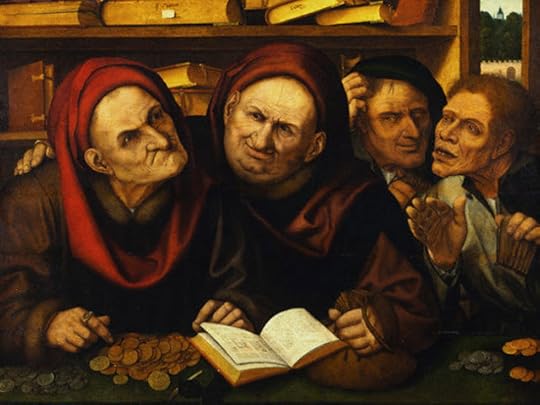 The Usurers by Quentin Metsys, Galleria Doria Pamphilj (Rome) Source: Wikipedia.
The Usurers by Quentin Metsys, Galleria Doria Pamphilj (Rome) Source: Wikipedia.Enter the word chevisance or chevance: essentially a form of disguised usury. This term was used regardless of the size of the loan. Contemporary literature is full of rebukes concerning this damnable practice, which they often referred to as bastard usury. To leave no trace, the sum recorded in the exchequer was the amount that was to be repaid, notwhat was loaned (the loan was known as mutuum). Often, the money that was loaned did not even go to the treasurer; he was only responsible for paying the debt and nothing more. Rarely was the documentation more precise than that. However, there was one incident that demonstrated how ruinous the rate could be. In 1376, the London merchant Richard Lyons was impeached with the charge that he took a 50% markup against the exchequer. It was said that he lent 20,000 marks and received back £20,000; a mark was 2/3 of a pound (not exactly 50%, but who knows?). John of Gaunt defended him, saying "that the rate was nothing out of the ordinary for a royal loan".² No wonder the exchequer was always broke! Cardinal Beaufort—one of the wealthiest men of his time—is said to have lent the crown an excess of £200,000 during his career (he survived well in to Henry VI's reign); there were times he was the only bulwark between the country and bankruptcy. It can only be assumed he didn't get rich on his benefices alone, and he was accordingly castigated by his detractors.
Although the official ban on usury wasn't lifted until the eighteenth century, in practice everyone pretty much looked the other way. After all, even the pope needed to borrow money. As long as it was for a good cause, usury could be rationalized...somehow.
References:¹ McFarlane, K.B., Loans to the Lancastrian Kings, the Problem of Inducement, from England in the Fifteenth Century, Collected Essays, The Hambledon Press, 1981, p.72
² ibid, p.77
Read about life in the 14th century...A KING UNDER SIEGE Book 1 of The Plantagenet LegacyBy Mercedes Rochelle
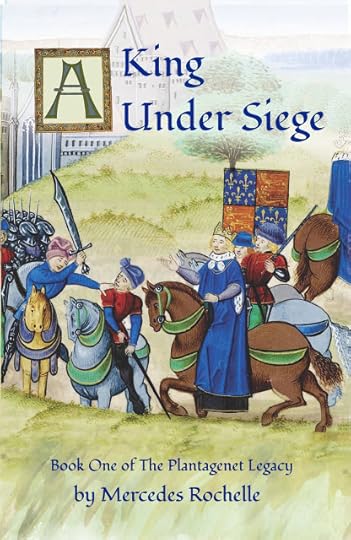
Richard II found himself under siege not once, but twice in his minority. Crowned king at age ten, he was only fourteen when the Peasants' Revolt terrorized London. But he proved himself every bit the Plantagenet successor, facing Wat Tyler and the rebels when all seemed lost. Alas, his triumph was short-lived, and for the next ten years he struggled to assert himself against his uncles and increasingly hostile nobles. Just like in the days of his great-grandfather Edward II, vengeful magnates strove to separate him from his friends and advisors, and even threatened to depose him if he refused to do their bidding. The Lords Appellant, as they came to be known, purged the royal household with the help of the Merciless Parliament. They murdered his closest allies, leaving the King alone and defenseless. He would never forget his humiliation at the hands of his subjects. Richard's inability to protect his adherents would haunt him for the rest of his life, and he vowed that next time, retribution would be his.Pick up your copy ofA King Under Siege
For *FREE on KindleAmazon UK • Amazon US
Now available on AUDIO
*Limited time only.
Mercedes Rochelle
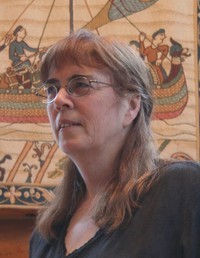 Born in St. Louis MO with a degree from University of Missouri, Mercedes Rochelle learned about living history as a re-enactor and has been enamored with historical fiction ever since. A move to New York to do research and two careers ensued, but writing fiction remains her primary vocation. She lives in Sergeantsville, NJ with her husband in a log home they had built themselves.
Born in St. Louis MO with a degree from University of Missouri, Mercedes Rochelle learned about living history as a re-enactor and has been enamored with historical fiction ever since. A move to New York to do research and two careers ensued, but writing fiction remains her primary vocation. She lives in Sergeantsville, NJ with her husband in a log home they had built themselves.Connect with Mercedes: Website • Blog • Facebook • Twitter
Published on February 27, 2020 20:00
February 26, 2020
#BookReview — This Day is Ours by Gretchen Jeannette #HistoricalFiction #HistoricalRomance @GAJeannette

This Day is OursBy Gretchen Jeannette
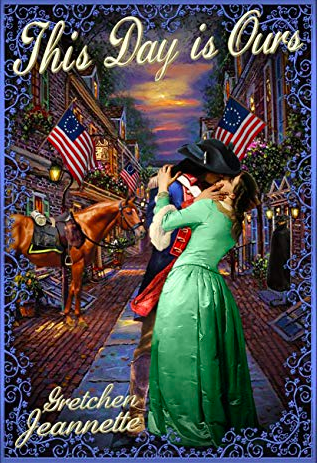
Love is like war: easy to begin but very hard to end.
The American Colonies, 1776.
As the flames of revolution spread across a divided land, a shadowy figure prowls the city of Philadelphia. Known only as Jack Flash, rebel highwayman, he preys on wealthy aristocrats loyal to the British Crown. The unpredictable outlaw always manages to stay one step ahead of his foes. Until the night he targets a Loyalist lady whose fiery spirit could spell his doom.
Alexandra Pennington believes she has her future well planned when a chance encounter turns her world upside down. Betrothed to a dashing king's man suited to her in every way, the young widow becomes entangled with an unrefined rebel fiercely opposed to British rule. Against all reason, she finds common ground with an enemy of the Crown. The sensible course for her is clear, but her bond with the notorious rogue will test her loyalty not only to her king but also to the man she vowed to marry.
From the drawing rooms of Philadelphia to the battlefields of an emerging nation, one woman stands between two men fighting for love and honor in a war destined to change all their lives forever.

"He's committed eleven robberies in the past three months. Last night alone, he stole a necklace worth a small fortune… He preys on Loyalists. It's obvious he's one of those Independents."
Well, at least they had one thing right. Jack Flash was all for an America independent of British rule, and if the wealthy aristocrats of Philadelphia, who were loyal to the Crown, could be persuaded to part with a few of their glittering jewels to help the cause then so much the better.
But last night, Flash had made a mistake. He had strayed where he should not. He had almost been beguiled by a woman's fragrance scent and a desperate desire to steal not only her jewellery but also a kiss. Fool that he was — every thief worth his salt knew that a man who could rob successfully while kissing a pretty girl was not giving the kiss the attention it deserved.
Mrs Alexandra Pennington missed her late husband dreadfully, but perhaps now she would be able to marry for love, and not out of necessity. Charles Villard was charming, handsome, and attentive. Elizabeth thought she could be happy with a man like him. That was until she found herself pinned against her bedpost with a pistol caressing her cheek. Elizabeth felt violated, but more than that she felt an incredible rage because the necklace Jack Flash had stolen was a cherished wedding gift from her late husband, John.
Chance would have it that the thief and the widow would meet again, and that chance meeting would change the course of their lives forever...
From a daring robbery to The Battle of Monmouth in 1778, This Day is Ours by Gretchen Jeannette is an enthralling Historical Romance that not only threatens to mesmerise, but does.
Written with a poetic verse and a romantic, yet tender, sensuality, This Day is Ours has a lot to recommend it. With an impressive sweep, Jeannette has not only penned an irresistible romance, but she has also composed a story that encompasses the American War of Independence in all its vivid detail.
Jeannette does not romanticise the American Revolution. With a keen sense of time and place, Jeannette has depicted the relentless misery of war — from the sheer terror of battle to the frustration of red-tape which stopped supplies from going to where they were needed. But Jeannette also explores the camaraderie between the men, the persistent courage of those who fought for the right to rule their country without interference. Their patriotic cause inflamed them. Even when it seemed that their cause was lost, they did not give up. They fought on until victory was theirs. The historical detail of this book has to be commended. I can only imagine how many hours Jeannette has spent researching this era for she has captured the very essence of America during this period of volatile history. Kudos, Jeannette. Kudos, indeed.
This book, of course, would be nothing without the fabulous characters that grace the pages. I fell totally in love with Jack Flash from the opening chapter. He is something of a contradiction. He is a thief, but he has more honour in his little finger than some of the other characters we meet in this book. Flash's gentle nature is at odds with his occupation, but at the same time, it is somehow fitting. Jeannette has given her readers a protagonist that they can really get behind. Flash is an endlessly fascinating character whom I enjoyed reading about very much.
I initially feared, as I do with all Historical Romances, that Alexandra Pennington was going to be one of those wilting heroines, whose wit and intelligence is somehow compromised by the era in which she lives, or, worse still, she was going to be one of those strong independent women who has very modern views that would be totally out of place to the century the book is set. Thankfully, Jeannette has given us a heroine that is neither wilting nor exceedingly modern. Alexandra sits very comfortably in 18th Century Philadelphia. Alexandra's story was endlessly fascinating. Alexandra risks everything by listening to her heart and falling for the roguish hero of this story. She risks not only the scandal, but during such a violent and uncertain time, Alexandra risks a great deal more. I thought Jeannette depicted Alexandra with a wonderful skill and diligence. I could not help but like Alexandra. She is a courageous woman who is faced with impossible choices which could have terrible consequences for herself and those she loves. I thought her depiction was brilliant and in keeping with this era and this story.
I am not going to talk about the antagonist of this tale for I do not want to give away any spoilers, but I would like to mention Alexandra's brother-in-law from her first marriage, George Pennington. George is such a lovable scoundrel, who is incredibly opinionated, which lands him and those around him in trouble more than once. Yet, he is utterly devoted to Alexandra. George is like a father to her. Alexandra is his beloved, and he just wants to see her happy and safe. I thought George's depiction was wonderful. He is superbly drawn — a real larger than life character.
As I approached the 2nd part of this book, I had a moment of fear that Jeannette would lose the momentum, lose the romance that had carried this story forward so beautifully and so compellingly. How would the lovers survive as war tore them apart? But I need not have feared, for the brilliance of this book is in the writing. It is in Jeannette's captivating narrative, her skill at depicting realistic and believable characters. Jeannette's ability as an author to grasp all aspects of the human condition — from love to hate and everything in between, makes this book an absolute triumph from start to finish. I fell in love with this book in the opening chapter, and I continued that love affair right up until the very last full stop. This Day is Ours is the kind of book that deserves the highest of accolades, for it is fresh, it is vivid, and it is absolutely enchanting.
If you are a lover of quality Historical Romance with a realistic setting and a tautly gripping plot then you will love This Day is Ours by Gretchen Jeannette. This is the kind of book that demands to be read again and again and again until the spine breaks and the pages fall out. It is deserving of a place on your bookshelf.
I Highly Recommend.
Review by Mary Anne Yarde.The Coffee Pot Book Club.
Pick up your copy ofThe Day is OursAmazon UK • Amazon US
Gretchen Jeannette
 Gretchen Jeannette was born in 1955 in Wilmington, Delaware. She lives and works in Chester County, Pennsylvania, an area rich in Revolutionary War and Colonial American history. Her enduring interest in 18th Century America began at a young age, inspired by the novels of Dale Van Every and Allan Eckert, whose timeless tales of adventure and romance capture the essence of early American lore. Eager to read more such stories, to her disappointment she had trouble finding them on bookshelves, so she decided to write one of her own. Thus began a journey fueled by her passion for breathing life into history through believable characters, authentic historical details, and plots woven with adventure, romance and suspense.
Gretchen Jeannette was born in 1955 in Wilmington, Delaware. She lives and works in Chester County, Pennsylvania, an area rich in Revolutionary War and Colonial American history. Her enduring interest in 18th Century America began at a young age, inspired by the novels of Dale Van Every and Allan Eckert, whose timeless tales of adventure and romance capture the essence of early American lore. Eager to read more such stories, to her disappointment she had trouble finding them on bookshelves, so she decided to write one of her own. Thus began a journey fueled by her passion for breathing life into history through believable characters, authentic historical details, and plots woven with adventure, romance and suspense.Connect with Gretchen: Website • Twitter • Goodreads.
Published on February 26, 2020 20:30
Please join me in conversation with #HistoricalFiction author, Douglas A. Burton #mustread #Interview @douglasaburton
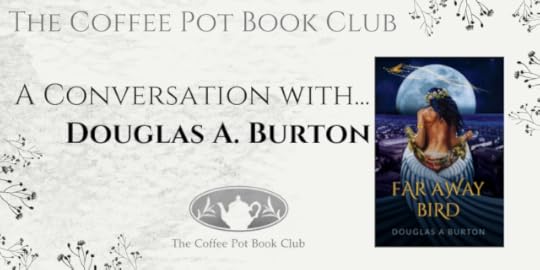
Please give a warm Coffee Pot Book Club welcome to Historical Fiction author, Douglas A. Burton.
 Cover designed by George Free, Treehouse Machine Studios.
Cover designed by George Free, Treehouse Machine Studios.DB: Thanks Mary! My name is Douglas A. Burton and I’m very pleased to be featured at the Coffee Pot Book Club. I noticed that your site is one of the top historical fiction sites on the web. That’s no small thing!
MA: It is, indeed, no small thing! I had the pleasure of reading Far Away Bird last year, and I wanted to ask you what inspired you to write about Empress Theodora?
 I’ve dreamed of writing an epic Byzantine novel ever since I checked out my first library book about the Byzantine Empire. When I first discovered this eastern Roman empire, which was confined to the Middle-East, the Balkans, and North Africa, my imagination filled with such rich and exotic images. There, on the library book pages, my mind’s eye witnessed eastern Roman emperors who dressed in silken and bejeweled robes, but in the fashion of the Orient. They spoke Greek instead of Latin and ruled over an empire of domed Christian basilicas instead of Greco-Roman pagan temples. Their military appeared more as a patchwork of chainmail-clad Crusaders rather than icon Roman legionnaires. They had political factions that revolved around chariot races at the Great Hippodrome, rather than fanatical Romans who watched gladiator matches at the Coliseum. And I felt like I, alone, discovered an exotic ‘second’ Roman empire because pop culture was silent on the matter. In the 1990s, I couldn’t find a single serious film with the Byzantine Empire as it’s setting. No TV shows. Nothing! No one seemed to know about this mysterious time and place.Driven to the point of creative madness, I tried to bring this world to life many, many times. And failed. In 2009, I made my first serious effort at writing a Byzantine novel. I wrote the novel in the first person with Justinian as the main character. I found myself 500 pages and roughly 160,000 words in when I realized that I had no structure or setup. I studied archetypes, story structure, and worked on my writing craft extensively. In 2015, when I switched to a limited third-person novel centered around Empress Theodora, the story took off. I used my knowledge of feminine archetypes and the hero’s journey into the fray.
I’ve dreamed of writing an epic Byzantine novel ever since I checked out my first library book about the Byzantine Empire. When I first discovered this eastern Roman empire, which was confined to the Middle-East, the Balkans, and North Africa, my imagination filled with such rich and exotic images. There, on the library book pages, my mind’s eye witnessed eastern Roman emperors who dressed in silken and bejeweled robes, but in the fashion of the Orient. They spoke Greek instead of Latin and ruled over an empire of domed Christian basilicas instead of Greco-Roman pagan temples. Their military appeared more as a patchwork of chainmail-clad Crusaders rather than icon Roman legionnaires. They had political factions that revolved around chariot races at the Great Hippodrome, rather than fanatical Romans who watched gladiator matches at the Coliseum. And I felt like I, alone, discovered an exotic ‘second’ Roman empire because pop culture was silent on the matter. In the 1990s, I couldn’t find a single serious film with the Byzantine Empire as it’s setting. No TV shows. Nothing! No one seemed to know about this mysterious time and place.Driven to the point of creative madness, I tried to bring this world to life many, many times. And failed. In 2009, I made my first serious effort at writing a Byzantine novel. I wrote the novel in the first person with Justinian as the main character. I found myself 500 pages and roughly 160,000 words in when I realized that I had no structure or setup. I studied archetypes, story structure, and worked on my writing craft extensively. In 2015, when I switched to a limited third-person novel centered around Empress Theodora, the story took off. I used my knowledge of feminine archetypes and the hero’s journey into the fray. MA: The Byzantine Empire is really overlooked, especially when compared with the Western Roman Empire. I have been fascinated with the Byzantine Empire for quite a while, and that was why I was so excited to read your book. Which leads me on to my next question, how did you come up with your setting and your characters?
DB: The setting was the Byzantine Empire by default. From the beginning, there was no doubt that Constantinople of the Sixth Century was going to be my primary setting. I determined that the underlying ethic to be solved was carnality. So, I used every possible setting where that ethic played out—a bathhouse, a brothel, arcades, and schools for prostitution, a concubinary, aristocratic sex parties, etc. And I made sure Theodora provided a substantive perspective throughout it all. In the end, her opinions and attitudes toward carnality change and lead her to develop a vision of the world where women are treated differently, where women have options, and where women may be viewed as equals instead of objects. Her entire journey matches up to the historical accounts very precisely. I think the only major detail I changed was her age when her father dies.
 Constantinople: Use by Permission.
Constantinople: Use by Permission.As far as characters, I wanted as many historical characters as possible, but I didn’t want “historical figures” self-consciously acting out history on the pages. I wanted human beings. I wanted characters who felt real, relatable, and authentic. I also paid special attention to my portrayal of women in the novel. I studied heroic women…a topic that needs more attention by the way…and I included different heroic personality types and mythic archetypes for women. There’s actually a lot of heroic women in the novel. Lastly, I wanted a heroine who suffered. I did not want to sensationalize Theodora or give readers a Mary Sue. I wanted a heroine who took the full force history in a male-dominated world and found a believable way to overcome her role in society. Theodora loses and fails and suffers and self-destructs a lot before she makes a stand. But when she does turn and fight, I wanted it to be the convincing (and unforgettable) emergence of a future empress.
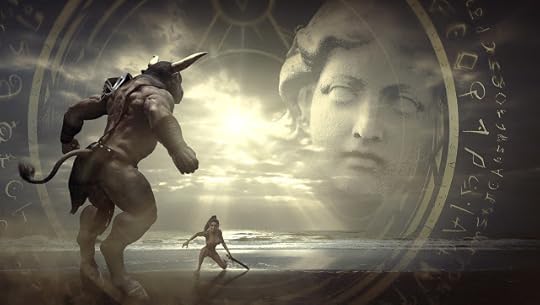
MA: Far Away Bird is a wonderful success, so I think it is a book that you should certainly feel very proud of. There are many books in the historical fiction genre. Can you tell us three things that set your novel apart?
DB: Sure! One distinction is the use of mythical tropes and archetypes for both the masculine and feminine in the story. I also applied the hero’s journey in this novel…but allowed myself to break from conventions any time the story called for it. I also felt that the hero’s journey lacked certain themes that related specifically to women. So, I found major elements in mythology that dealt with the feminine and wove them all into the narrative. The result had a powerful impact on me as a writer, so I hope it has a powerful effect on readers.Second, I think my book is distinctive in its style of visual storytelling. I made sure each setting meant something and provided critical details. Characters constantly interact with the world of Byzantium. I wanted scenes to feel cinematic rather than merely descriptive.And third, I think my story is distinctive as a novel about Empress Theodora. I make a serious effort to reconcile her historical personality from a psychological point of view. In an unrelated non-fiction book, I encountered bizarre psychological case studies about female exhibitionists, meaning, women who have an aggressive tendency toward nudity. The psychologist Leon Wurmer pointed out that in many of the extreme cases, female exhibitionists partook in something called “counterphobia,” which is engaging excessively in a behavior that the person genuinely fears. His conclusion was that women who exhibited their body so determinedly did so out of an attempt to remove a trauma regarding their body, such an abuse. I wondered if Theodora’s historical infamy may have been rooted in traumatic abuse and feelings of shame. I suddenly saw her in a different light. The novel spends a good deal of time addressing the human experience of shame. And researching this topic unwaveringly opened my eyes to the fact that this problem is widespread and persists to this very day.
MA: Last, but not least. Can you tell us what you are currently working on?DB: I’m working on two things. One is the sequel to ‘Far Away Bird.’ Book 2 centers on Theodora as she becomes an empress and attempts to assert her power and will in the Byzantine government. I plan on exploring the feminine power archetypes and power dynamics for women in male-dominated settings. I want her transition from an unwanted guest of the palace to one of the world’s most incredible female autocrats to be believable and carry real-world wisdom.
 The Heroine’s Labyrinth.
The Heroine’s Labyrinth.And finally, I’m working on an alternative to the hero’s journey. Writing about Theodora changed my entire world view about women and about fiction. I decided that the hero’s journey, while perfectly valid, is essentially a male-oriented hero arc. After studying so many heroic women, I realized that heroines consistently deviate from the hero’s journey and carry recurrent themes of their own. From Clarice Starling to Wonder Woman to Dorothy Gale, our heroines are modeling a different type of heroic behavior. Their enemies are rarely distant dragons who threaten the native culture from afar. Nope. Heroines tend to face masked minotaurs embedded from within the native culture. Heroines often model behaviors that break gender roles and traditions. They often physically interpose themselves in between a powerful enemy and a defenseless life. In fact, I’ve found a ton of recurrent themes in heroine-centric stories that I think form the basis of an entirely separate monomyth for narrative structure. I call it the heroine’s labyrinth. I’m very excited about it. If this sounds interesting to you, check it out on my website at douglasaburton.com. You’ll see a section devoted to the heroine’s labyrinth.
MA: I cannot wait to read the sequel to Far Away Bird! Thank you so much for taking the time out of your day to chat with us today. If you would like to learn more about Far Away Bird and read a fabulous excerpt then you know what to do — scroll down!
Excerpt
Theodora gets an early lesson about power in Chapter 24.
Theodora and Macedonia stood side by side, sweeping through a series of dance stretches. “You must engage men directly,” Macedonia said. “This is not so easy for some women because it involves confrontation. But you must learn how to oppose a man and to let your opposition strengthen your position with him.”
“What does that mean?”
“There are three basic roles to any relationship,” said Macedonia. “A master, a servant, and a peer. These roles are very defined among men, but with you, he will always assume himself the master. The world has taught him this and now you must teach him otherwise. Put a man in conflict, and he’ll work his way out, one of their great strengths, but you’ll use it to your advantage. When you learn what drives each man, you must challenge him on his ground. You’re to become the impetus,” she said and pulled out of the dance stretch. She turned to Theodora and lifted her chin. “If he is arrogant, doubt him. If he is ignorant, correct him. If he worships you, command him. If he is timid, embolden him. If he is judgmental, discredit him. If he is broken, console him. If he is withdrawn, ignore him. If he is a dreamer, inspire him. If he is irritated, pester him. If he is demanding, deny him. If he is threatening, turn and face him,” she said. “Too many women challenge men as the servant, using anger without power, and a powerless woman will eventually falter. Men are prepared for confrontation, and so too must you be. And when he responds to your opposition, you will remain composed, unflinching, and assertive.”
Theodora sighed and asked the inevitable question. “But what if he becomes violent?”“Then he seeks authority over you, Theodora. If he strikes you, stand tall and dare him to do it again.”
That wasn’t the answer Theodora was looking for.
“Remember, we’re speaking about a man with whom you’ve established some level of trust and rapport. He’ll be a friend, a relative, or lover. If that man should turn against you, if he should strike you, you must confront him immediately.” Macedonia repeated herself, but slowly. “Stand tall and dare him to do it again. The power of violence is not the violence itself, but whether you accept his sole authority afterward. And you will not accept it. With each blow you defy him. His authority is collapsing, even while he believes he’s enforcing it.”
“And if he kills you?”
Macedonia stepped in close again and grabbed Theodora’s robe. “Then let this be your burial shroud. Wear it proudly. If you desire power, Theodora, then you better know the price. You go all the way. The wellspring of all power in this world comes from a willingness to face death for your own autonomy in this life. That is the covenant. No person or nation has ever risen without facing this brutal and powerful truth.”Theodora stared back at Macedonia, stunned, feeling the weight of her mentor’s lesson more heavily than normal.
Macedonia continued. “And why should women fear death? We stare death in the face to bring life into this world, and we do so willingly. So, tell me, which is the better burial shroud? The one you wear now, or the one you’ll wear as an old woman who feared death and died anyway? Because I say that a woman who dies on her feet never really dies.” Macedonia blinked and glanced above Theodora as if she saw something there. “She is swept up from the earth in a magnificent gale, and she’ll leave this world sovereign.” Macedonia reset her eyes on Theodora. “An unconquered woman.”
Unconquered.
The smaller of the two Theodoras heard the word. She circled her thoughts around it. But like a wolf drawn in by a bright and mesmerizing fire, she feared to go any closer.
Far Away BirdBy Douglas A. Burton
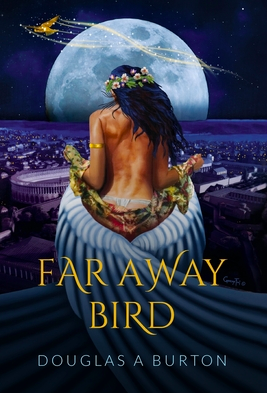
Inspired by true events, Far Away Bird delves into the complex mind of Byzantine Empress Theodora. This intimate account deftly follows her rise from actress-prostitute in Constantinople's red-light district to the throne of the Byzantine Empire.
Her salacious past has left historians blushing and uncomfortable. Tales of her shamelessness have survived for centuries, and yet her accomplishments as an empress are unparalleled. Theodora goes on to influence sweeping reforms that result in some of the first ever Western laws granting women freedom and protection. More than a millennium before the women's rights movement, Theodora, alone, took on the world's greatest superpower and succeeded. Far Away Bird goes where history classrooms fear to tread in hopes that Theodora can finally take her seat among the greatest women in history.
Theodora seems impossible--yet her transcendence teaches us that society can't tell us who we are deep down. Before there was a legendary empress, there was a conflicted young woman from the lower classes.
And her name was Theodora.
The Coffee Pot Book Club
★★★★★
Highly Recommended
Read the full review HERE!

The Historical Fiction Book of the Year
2019
The Early Medieval Period
Gold Medal

Debut Novel Book of the Year 2019-
Bronze Medal
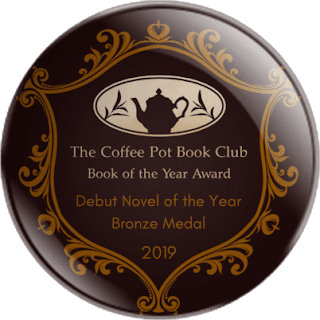
Pick up your copy of
Far Away BirdAmazon UK • Amazon US
Douglas A. Burton
 Douglas Alan Burton is a speaker, author, and expert storyteller whose work depicts heroic figures and their deeper connection to the human experience. Doug blogs about heroes, heroines, and villains in pop culture with some unexpected and refreshing perspective. He grew up in what he describes as “the heroic boyhood culture of late Generation X” that has gone mainstream around the world. He also shares strategies with fellow writers for writing compelling heroic characters in fiction.
Douglas Alan Burton is a speaker, author, and expert storyteller whose work depicts heroic figures and their deeper connection to the human experience. Doug blogs about heroes, heroines, and villains in pop culture with some unexpected and refreshing perspective. He grew up in what he describes as “the heroic boyhood culture of late Generation X” that has gone mainstream around the world. He also shares strategies with fellow writers for writing compelling heroic characters in fiction.Douglas recently began outlining a breakthrough storytelling model that reveals a fascinating “heroine-centric” model for story structure he calls The Heroine’s Labyrinth. He believes a powerful new archetype is emerging for women in fiction. His forthcoming novel, Far Away Bird, which centers on the early life of Byzantine Empress Theodora, won the 2019 Manuscript Content for Historical Fiction from the Writers’ League of Texas.
Connect with Douglas: Website • Blog • Twitter.
Published on February 26, 2020 20:00
The Coffee Pot Book Club
The Coffee Pot Book Club (formally Myths, Legends, Books, and Coffee Pots) was founded in 2015. Our goal was to create a platform that would help Historical Fiction, Historical Romance and Historical
The Coffee Pot Book Club (formally Myths, Legends, Books, and Coffee Pots) was founded in 2015. Our goal was to create a platform that would help Historical Fiction, Historical Romance and Historical Fantasy authors promote their books and find that sometimes elusive audience. The Coffee Pot Book Club soon became the place for readers to meet new authors (both traditionally published and independently) and discover their fabulous books.
...more
...more
- Mary Anne Yarde's profile
- 159 followers



